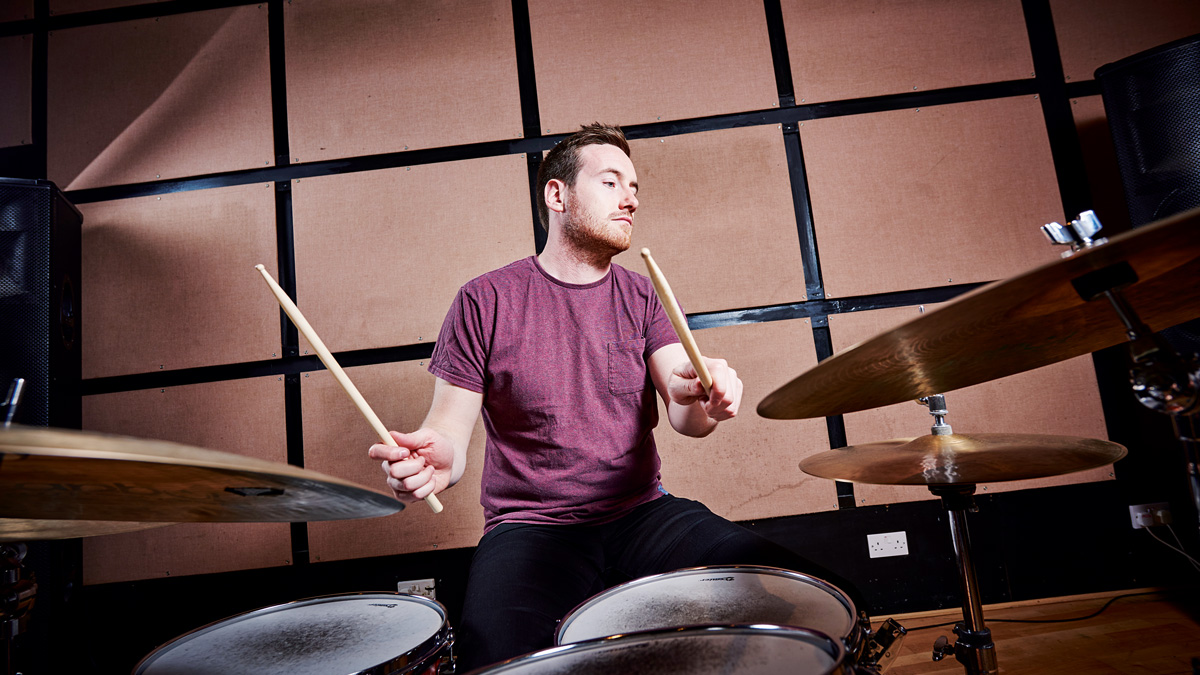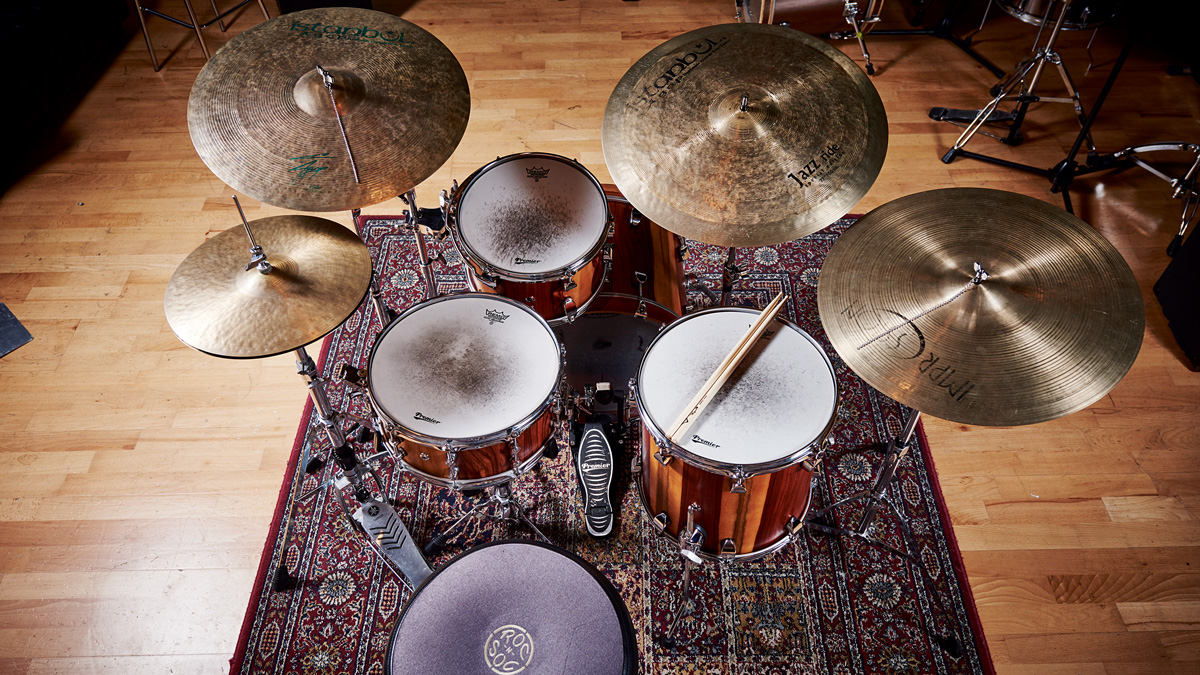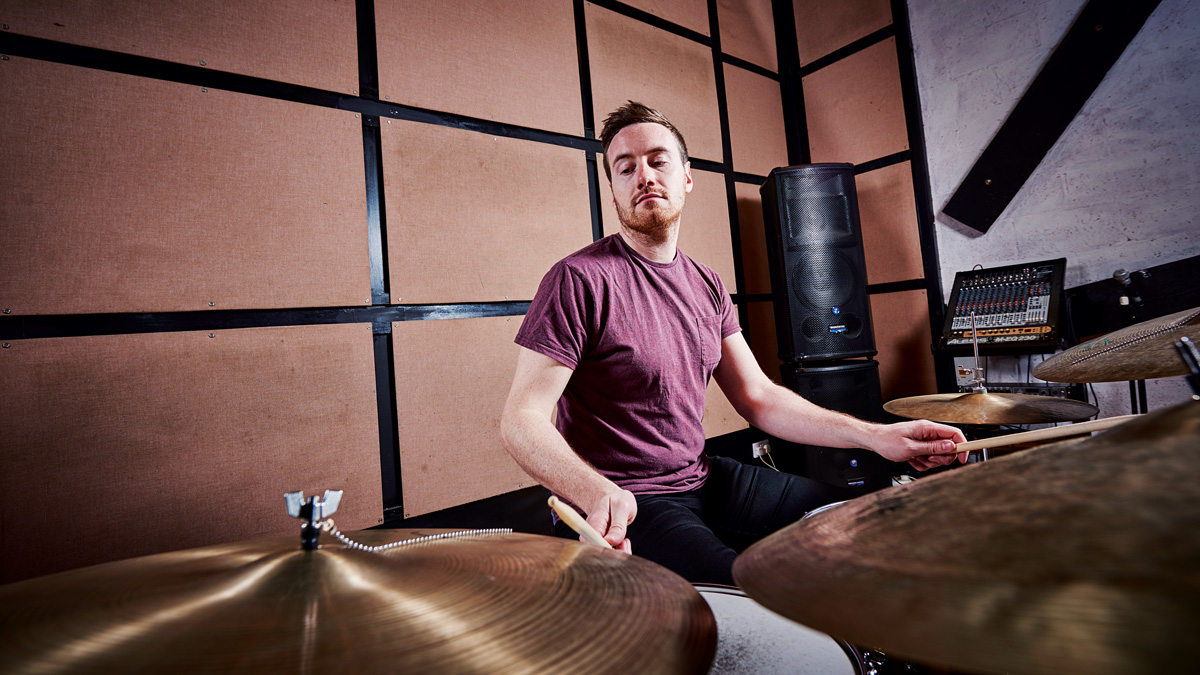Ollie Howell talks Quincy Jones, Jimmy Cobb and why he didn’t want to make a drummer’s album with Self-Identity
Brit jazz sensation on is meteoric rise

Carving a solo Self-Identity
When Quincy Jones launched his new nightclub, Q’s, in Dubai, he chose young British drummer and composer Ollie Howell to take the opening residency.
Still in his twenties, Howell is a fast-rising jazz star who’s on a mission to bring new, younger listeners to the genre. Howell met Quincy Jones while still a student doing his degree in jazz studies at the Welsh College Of Music.
“Quincy had just taken part in one of those TV shows when they go into your DNA and find out your heritage and he found out he’s a quarter Welsh,” says Howell.
"He was blown away, so my college offered him an honorary fellowship. I had to meet him in the hotel and take him to college where there was a hall with 200 people and TV cameras.
"He sat in a big chair down the front, I sat behind the kit and had to play with my group. I didn’t have time to think about it. It didn’t even sink in that I was playing for somebody I’d been listening to for decades.”
Jones was so impressed by what he heard that he took Howell under his wing. It hasn’t all been smooth seas and friendly skies, however: Howell’s 2013 debut album Sutures And Stitches was conceived while he underwent and then recuperated from a series of operations to correct a brain malformation.
Now fully recovered, when we meet Howell in a recording studio in north west London, he’s just released his second album, Self-Identity.
Howell wasn’t always a dyed-in-the-wool jazz man. As a youngster, he listened to all sorts of music. “I used to love The Beatles, Elvis Costello, and then I started listening to pop-punk, I loved Travis Barker,” he says. But when the jazz bug bit him he found his calling.
I used to love The Beatles, Elvis Costello, and then I started listening to pop-punk, I loved Travis Barker
“I immediately started listening to Art Blakey and Max Roach and Elvin Jones. They still are huge drumming heroes.”
While at the Welsh College Of Music, Howell and his classmates would study and practise during the day, then drive to London to join the late-night jam sessions at Ronnie Scott’s, staggering back to Wales bleary-eyed the next morning. Since meeting Quincy Jones, Howell’s career has taken off like a rocket.
“Initially, the help I really needed was meeting people and getting my name out there. He would take me to New York, LA, Montreux Jazz Festival and introduce me to people, which was so helpful because you don’t have to try to sell yourself when you’ve got someone like that.
"Then he said, ‘I’m going to open this jazz club in Dubai, I’d really like you to come and be the opening artist. You can stay there for three months and play every night. I want you to play your music.
"I don’t want you to play Fly Me To The Moon like a hotel lobby jazz band. Play your tracks and stay there with your band.’”
A three-month residency is virtually unheard of in this day and age and Howell jumped at the chance to set up shop in Dubai. “It was incredible. We were staying at the Palazzo Versace hotel so everything was Versace - the lamps in the hallway, the beds, everything,” he says.
Dubai is full of very big buildings and expensive things, huge ceilings with chandeliers, then you walk in to Q’s and it’s all dark, it’s a perfect jazz club: low ceilings, intimate
“Dubai is full of very big buildings and expensive things, huge ceilings with chandeliers, then you walk in to Q’s and it’s all dark, it’s a perfect jazz club: low ceilings, intimate. It’s the complete opposite of everything around you in Dubai so people were loving it just as a place to go and see live music.
“We were playing three sets a night, five days a week with my band. We were writing out there and arranging. I was there when Quincy walked in for the very first time.
"He’s been trying to build a jazz club for about 13 years in different locations so to walk in with him into the room and feel the love and appreciation he had for the place was really heart-warming and moving.
“He stayed for about a week, we did lots of joint press, hung out and went to parties. We did the official press launch as a double bill with Dirty Loops, which was great. I’ve liked them for years, a very different style but it worked really well, it was a fun night and a very special moment.”

In The Real World
The new album Self-Identity was recorded in 2016, before the Dubai residency, at Peter Gabriel’s Real World Studios near Bath.
“I’d seen photos of it and had a couple of friends who’d done sessions there but it doesn’t do it justice,” says Howell. “It’s a really inspirational place to make music and, of course, you’re there living on site, so you’re away from London in the middle of the countryside.
"Everybody loves making albums that way because you feel like you’re there for a purpose.”
Sutures And Stitches was very much the sound of an acoustic jazz group, but Howell wanted to bring in some new sonic elements for Self-Identity, a reflection of the fact that between the two records he had begun to move into composing for film and television, getting to grips with electronics and the production side of music creation.
“I didn’t want to change the sound of my band too much but I wanted to have a little play with things,” he says. “The opening track is a mixture of 13 different outtakes we did and weird mix-ups.
"There are two points in the album, In Truth and In Search, that are almost interlude sections that are recycled outtakes.
“They’re only two minutes long but it’s a nod to the stuff we do live now. The saxophonist has a whole effects pedal board, mostly reverb and a little bit of looping, then I have a keyboard where I play synth with one hand and the kit with the other so it’s transitioning more towards that side of things.
"But I didn’t want to lose that energy you have with an acoustic jazz band and that interaction. That’s why we decided to do it somewhere like Real World and use the big wood room for the drums, so it didn’t feel like a heavily-produced studio album. It still has that rawness and excitement about it, with just a little bit of extra fun for me.”
All About Tone
Howell’s kit of choice comes from Premier’s One Series, custom-made for him by the company.
“It’s the old cliché but it’s true, the first kit I played was Premier when I was learning at school,” he says about his selection. “The company has been up and down over the years but as much as I love the brand and the history and the heritage of it, I wouldn’t be playing them if I didn’t love the sound as well.
"They made me an incredible kit a couple of years ago, which is beautiful and sounds incredible so I’ve been really happy with that. It’s maple and it’s got this padauk wrap around it.”
Playing in an acoustic jazz setting, even with some electronics and effects pedals, Howell’s main priority for the kit was the tone of the drums.
“I think jazz drummers are good at it but in other genres people don’t use the full dynamic range of the drum kit,” he says. “People play from loud to super-loud and I think the drums have such a wonderful tone when they’re quiet. I often have bits in the set where I’ll play some of it with my hands and go really quiet.
"Tone is so important to me. I’m not so worried about the projection being loud. I’ve played around on a couple of different kits and I tend to like maple. I’ve played on some great kits, some Rosewood, it’s got a totally different character. For jazz, maple kits have always been preferred because it’s got such a lovely quality to it.”
Why Melody Matters
While he’s the bandleader and it’s his name on the billboards, Howell says he didn’t want Self-Identity to sound like a drummer’s album.
“I wanted people to enjoy it because it’s music, there’s a melody,” he explains. “Obviously, there are the solo sections, but just in terms of the way that I write the melody or structure the set, I want people to have freedom to have their moment and then to sync back and for it to feel a bit more like we’re a band.
“We’re a unit, there’s a sound world that we’re making rather than I’m leading, it’s my tune. When you listen to all those great jazz records, if you listen to Miles Davis’ Kind Of Blue, it doesn’t sound like a trumpet player’s record, it sounds like that band in that studio at that time. I wanted to maintain that.”
Self-Identity has seen Howell sign with Ropeadope Records, home to boundary-stretching artists like Christian Scott, Nate Smith and Nicholas Payton. It’s all part of Howell’s vision to bring jazz to new listeners.
"He says the audiences on the tours for Sutures And Stitches were primarily traditional, dedicated jazz fans, but for Self-Identity he held the album launch gig at Rich Mix in Shoreditch, a venue better known for world and dance music than jazz.
“I think contemporary jazz is coming into the mainstream world more in terms of audiences,” says Howell.
“I don’t know whether that’s in terms of streaming or through people like Snarky Puppy bringing in audiences from other places, but there’s variety now. At Rich Mix it was mostly young people, 18 to 30 - but then you get some more hardcore jazz fans coming down as well.
"It was the same in Dubai. We had a mix of people because they were new to the country - they’d only just moved there and they wanted a cool place to listen to some original music, and then you had jazz club fans.
“It’s obviously fun playing to a younger audience because they get more into the music and they’re more vocal about their appreciation. I really like finding audiences that are on periphery of potentially liking jazz.
"I love playing to those people because you can introduce them to stuff. If they like my music then they’ll probably like thousands of other records that are technically jazz but they wouldn’t perhaps think of them in terms of the genre.”

The Art Of Freedom
Part of Howell’s approach to jazz is to keep the melody up front and centre, while still embracing the vast possibilities of improvisation.
“With my music, I like to have the form fairly established but have this huge section in the middle that is quite free,” he says. “I’ll always write some chords or a vague tonality but I like having something more orchestrated during the melody so that the melody is definitely at the forefront because I felt like that was missing from some contemporary jazz.
“I’ll write bits in the set where I know that we’ll finish a tune in a key and we’ll be starting the next tune in another key and I have a vague sound world I want to create in-between so I’ll say to the guys, ‘This is vaguely going to be Ab major then it might slip down to F minor for a bit’ and we’ll weave around and that’s completely improvised.
"I think that’s really exciting. It’s fun for us because we’re getting to truly improvise onstage, that’s a free section that will be totally different every night and the audience vibes off that as well.”
As to the key to becoming confident and capable of jumping into improvisation live onstage and in the moment, Howell’s message is clear.
“You’ve just got to be practising, practising, practising, because your muscle memory can take over a lot,” he says. “I guess as a jazz musician, whatever instrument you play, to a certain extent with any music, the goal is to be able to play anything that you have in your head.
"There’s no stop time to think, ‘Okay, this will have to be a paradiddle here.’ You just want to be able to react, especially when you’re playing jazz and we’ve got huge improvisation sections. I want to be on the edge and then if somebody goes into a certain area, I’ll go right with them or I’ll let them speak.”
Howell credits the hours of practise he put in during his years at college. When he wasn’t sitting at the kit in college, he’d be at home with a practice pad in front of the TV watching Friends or Scrubs.
“A lot of it is just having to practise so many different permutations of movement around the kit and rudiments,” he says. “That’s really the key because then it gives you the confidence to just go anywhere because you know whatever happens your hands or your feet will sort it out.
"I know it’s the same talking to sax players and pianists: you need to study the science behind it first and then it gives you the freedom to go off however you want.”
Learning From The Masters
As if having one famous mentor in Quincy Jones wasn’t enough, Howell’s talent has also attracted the attention of Jimmy Cobb, who played with John Coltrane, Cannonball Adderley and with Miles Davis on his seminal Kind Of Blue album.
The two drummers met back in 2009 when the youngster performed at a masterclass and Cobb was so impressed he has helped to promote Howell’s career and music ever since - they even appeared in a joint feature in Rhythm back in 2013.
“He’s such a chilled-out guy,” Howell contemplates. “One of the things I loved about his approach to drumming is that he said it’s all about the music. I think you can really hear it in his ride cymbal playing - you know that he really means every note. He’s not just doing ‘ding-ding-da-ding’ because that’s what jazz drummers are supposed to do.
"He’s really laying it there because it’s exactly the right thing for the music and he’s always thinking about that. He’s never been one of those drummers that does tons of solos and is always at the forefront. It’s always slightly more reserved and I really love that approach. I think it sits so beautifully in the music, what he does. I do try to think about that.
“I remember really thinking about it when I was practising a lot when I was at college - considering what the default ride cymbal pattern should be. I tend to think of crotchets as my default, rather than going ‘ding-ding-da-ding’ all the time.
"If I’m putting skip notes in there it’s because, musically, I want it to be like that way at that point. If you play in that way, then you don’t ever feel like you’re doing things for the sake of it. You’re purposely putting each note in that place and at that time because it suits the bigger purpose of the music.”